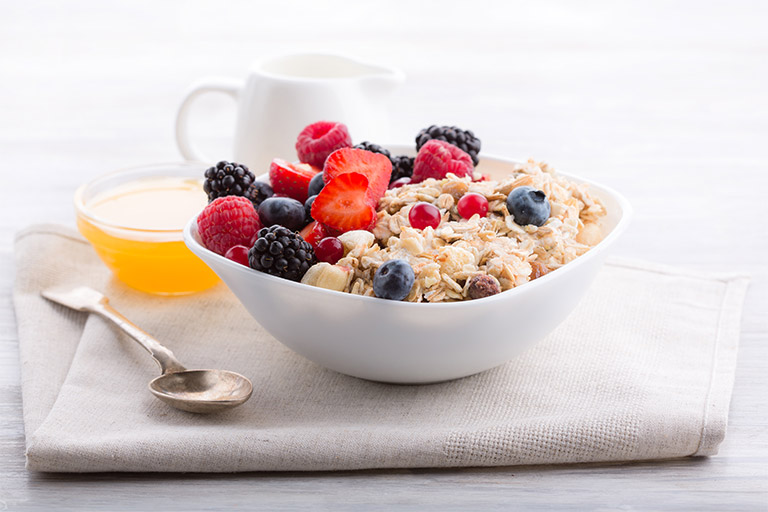Best Food for Gut Health
- 12 Sep, 2024
- Written by Team Dr Lal PathLabs
Medically Approved by Dr. Seema
Table of Contents
The gut plays a central role in the well-being and overall health of the human body. In addition to being a key component of the human digestive system, it also helps produce vitamins, fend off harmful bacteria, and support and strengthen the immune system.
Maintaining gut health involves various factors, with diet being one of the most important. Choosing the right foods can help prevent gut problems. In this article, we will delve into what gut health is, how it impacts the body, and gut-healthy foods.
What is Gut Health?
The gut is the gastrointestinal tract of the human body. It contains trillions of microbes (including viruses, bacteria, and fungi), mainly in the cecum, a pocket of the large intestine. These are referred to as the gut microbiome.
Each individual’s microbiota is unique, similar to a fingerprint. It is partly determined by the mother’s microbiota and the individual’s diet and lifestyle. These microbes line the entire digestive system and live mainly in the intestines and colon.
They are responsible for affecting metabolism and mood, fighting pathogens, producing vitamin K and other necessary chemicals, influencing the immune system, heart health, and mental health, and playing a role in ageing and longevity.
What are the Signs of Poor Gut Health?
Many modern lifestyles, such as stress levels, a lack of sleep, processed and sugary foods, and antibiotic medications, can adversely affect gut health and microbiome. These, in turn, can affect immunity, weight, and hormone levels.
Some signs and symptoms of poor gut health include:
1. Stomach Disturbances
Stomach disturbances like bloating, gas, constipation, diarrhoea, and heartburn are indicators of poor gut health.
2. Fluctuations in Weight
Unintentional weight loss can indicate malabsorption caused by small intestinal bacterial overgrowth or SIBO. On the other hand, weight gain may be linked to inflammation or insulin resistance.
3. Fatigue and Disturbed Sleep
A study published in the National Library of Medicine indicates that gut bacteria imbalances may be linked to disturbed sleep patterns, leading to chronic fatigue. This may be linked to inflammation, metabolism, and mental health.
4. Food Intolerances and Autoimmune Conditions
Food intolerances refer to difficulty digesting certain foods, and research indicates poor-quality gut bacteria could cause them.
Which Foods Improve Gut Health?
A varied diet is essential for gut health. Below are some of the best foods for gut health:
1. Foods with Fibre
Fibre is a carbohydrate in plant-based foods categorised as soluble or insoluble. Both improve gut health by aiding digestion and preventing constipation. Eating these foods can protect the body from conditions like high blood pressure, type 2 diabetes, heart disease, and some types of cancer.
Beans, lentils, dried peas, bran, dried fruits, whole grains, fresh fruit, nuts, seeds, and vegetables are good sources of fibre.
2. Probiotic Foods
Probiotics contain living organisms similar to the healthy microbes that live in the gut. Gut-healthy foods like kimchi, kombucha, and kefir contain these microbes, boosting the body’s beneficial bacteria count. These foods are typically made by adding microbes or fermenting food.
Examples of Indian probiotics for gut health include Dahi (Yohurt), Chaas (Butter Milk), Idli, Dosa, Pickle (Achaar), Kanji & Sol Kadhi. Probiotics are also available as gut health supplements. It is best to use these with guidance from a medical professional.
3. Prebiotic Foods
Prebiotic foods contain soluble dietary fibre and are necessary for feeding the good bacteria in the gut. They include bananas, garlic, oats, onions, soybeans, and asparagus, among others.
Incorporating probiotics and prebiotic foods into one’s meal is also a quick and easy way to get the needed nutrients. Some food combinations could include yoghurt and berries, banana smoothies with yoghurt or kefir, and asparagus and garlic.
4. Anti-Inflammatory Foods
Inflammation in the body results from white blood cells and other compounds being released to protect from infection. The release of white blood cells is necessary to fight disease. However, the body sometimes has this reaction when it is not needed. This can worsen gastrointestinal health and contribute to conditions like irritable bowel syndrome.
Anti-inflammatory foods have nutrients like vitamins, minerals, and omega-3 fatty acids. These help reduce inflammation and may promote gut health. Some healthy anti-inflammatory foods include fatty fish (like salmon), flax seeds, fruits (like berries and grapes), vegetables, and walnuts.
Eating a diet loaded with fats, sugars, and refined carbohydrates can cause a drop in healthy gut bacteria. To build a healthier gut biome, it’s important to focus on unprocessed, nutritious foods. This means incorporating plenty of high-fibre options, like fruits, whole grains, vegetables, and healthy fats and proteins in one’s meals.
If someone is experiencing symptoms of poor gut health, they should consult a medical professional for further guidance. To book gut health tests, visit Dr Lal PathLabs’ website today.
FAQs
1. What are the signs of an unhealthy gut?
Some signs of an unhealthy gut include poor sleep, stomach disturbances, and food intolerances.
2. What foods help with gut health?
Vegetables, fruits, whole grains, salmon, and berries improve gut health.















